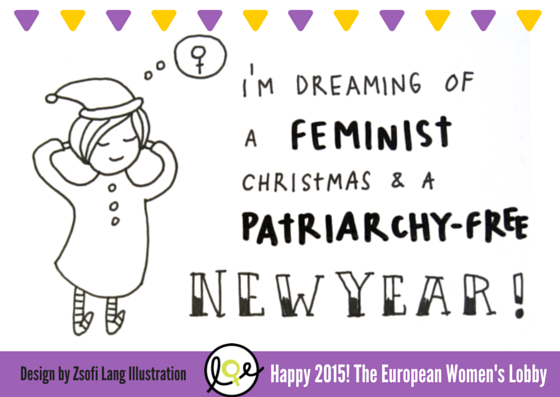[Brussels, 14 June 2011] On 7 June, the European Commission adopted 27 sets of “country-specific recommendations” that Member States should take into account in their economic, employment, and social policies next year. The EWL welcomes the fact that the Commission asks the Member States to do more to increase women’s employment rate and to improve child care services, but regrets that the recommendations do not sufficiently address the low quality of women’s work, including the gender pay gap, and the gender inequalities that keep women away from labour markets.
The European Pact for Gender Equality 2011-2020 adopted by the EPSCO Council on 7 March 2011 invites the Commission and the Council to incorporate gender equality perspective to the Country Specific Recommendations. The EWL’s analysis of the recommendations adopted by the Commission reveals that the Commission has accepted this invitation only partly.
The EWL has written to the Ministers of Employment and Social Affairs who will discuss the recommendations on 17 June before they will be endorsed by the European Council, and asked them to strengthen the gender equality dimension of the Commission’s proposals.
Focus on childcare services
In its assessment of the challenges that the EU Member States face and of the measures they have proposed in their National Reform Programmes (NRPs) to achieve the 2020 targets, the Commission pays specific attention to women’s low employment rate. Subsequently, the Commission considers the low availability of childcare facilities as the main barrier to women’s employment.
The Commission gives direct recommendation to eight of the 27 EU Member States to increase women’s labour market participation in the next 12-18 months. Seven countries (Austria, Czech Republic, Germany, Hungary, Italy, Poland and UK) are required to increase the accessibility and affordability and, in some cases, also the quality of their childcare facilities. Germany and Netherlands are asked to review their tax systems to move family based taxation to individual taxation. In addition the Czech Republic is asked to make flexible work arrangements more attractive.
The EWL welcomes the fact that the Commission requires Member States to increase the accessibility and affordability of childcare services, and asks Member States to immediately turn these recommendations into action.
Broad gender equality perspective is missing
The Commission’s recommendations do not pay enough attention to the low quality of women’s jobs that remain in gender segregated framework coupled with low pay, persistent gender pay gap and high-levels of part-time work in most EU Member States.
For example, gender pay gap is that in average is at 17.5% is a problem across the EU, but the Commission only mentions it in its recommendation for Austria (gap 25.5). The gap is more than 20% also in Estonia (30.9), Czech Republic (26.2), Germany (23.2), United Kingdom (21.4), Cyprus (21.6), Lithuania (21.6) and Finland (20).
Women’s overrepresentation in part-time work (in the EU women’s part time work rate is 30.7 % points higher than men’s) is not sufficiently acknowledged, nor its links to the gender pay gap. The fact that gender inequalities in the labour market are linked to inequalities at home is also overlooked: unequal share of care responsibilities between women and men should also be acknowledged.
In general the country-specific recommendations themselves suffer from a lack of the gender equality perspective. The few specific recommendations to increase women’s employment rate may be undermined by other recommendations that have an disproportional negative impact on women’s lives, for example ones to cut the expenses of public sector – where women are the majority of public sector workers and welfare recipients; cuts in public sector expenses may also result in the transfer of services such as care back to women.
EWL recommendations for the future
The EWL recommends that in the future equality between women and men is incorporated in the country specific recommendations in a more systematic manner, notably:
- The Recommendations must look beyond the female employment rate and pay more attention to gender inequalities in the labor market and the way these are linked to gender inequalities at home. For example Member States could be required to draft action plans to eliminate gender inequalities in the labor market;
- More attention needs to be paid to specific groups of women such as immigrant, disabled, older women and single parents (notwithstanding the fact that some of these groups are referenced in some national recommendations);
- The country-specific recommendations themselves should be gender mainstreamed. The few specific recommendations made to increase women’s employment rate may be undermined by other recommendations, for example ones that require the Member States to cut the expenses of public sector.
Read all the country-specific recommendations here.





